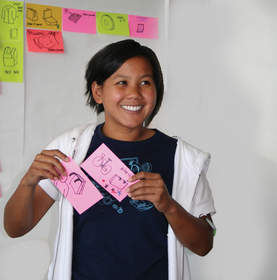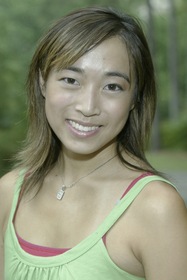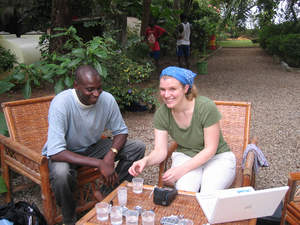Engineer Your Life(TM) Sheds Light on a Top Career Choice for Young Women
Coalition Develops National Campaign to Reposition Engineering as a Creative, Exciting and Rewarding Field for Women
| Source: WGBH Boston
BOSTON, MA and WASHINGTON, DC--(Marketwire - July 28, 2008) - Engineering is a vibrant
field that offers boundless opportunities to the innovative people who make
up its ranks. It is an excellent choice for anyone interested in a
rewarding, well-paid career -- so why the dearth of women engineers?
Research indicates that low enrollment rates of college-bound young women
choosing engineering as their major have led to dwindling numbers of
females entering the profession, suggesting that women do not perceive
engineering as relevant to their educational or professional goals.
Engineer Your Life (www.engineeryourlife.org) is a national campaign that
aims to close the gap by enlightening girls about the opportunities
available in the world of engineering. This dynamic initiative is
spearheaded by members of the engineering community and WGBH Boston, who
teamed up in 2004 to find out why girls weren't participating in
engineering in greater numbers. The program is built around three key
messages -- creativity has its rewards, make a world of difference, and
explore the possibilities -- which aim to change the perceptions
high-school girls have about engineering and to encourage them to enroll in
undergraduate engineering programs.
Anchored by its interactive multimedia website, Engineer Your Life
(engineeryourlife.org) showcases 12 in-depth profiles of young female
engineers whose choices embody the campaign's key messages and provides
information on the paths they took to reach their professional goals. Their
stories present engineering as a realistic option for young women who are
interested in careers that make a difference in the world while being
flexible, fun, and creative, and as a goal that is desirable and within
their reach.
Through the profiles, visitors to the site get a glimpse of the women who
make up the next generation of engineers and enjoy a day-in-the-life look
at their dynamic professional lives.
Creativity Has its Rewards...
Judy Lee has always loved learning how things work and knew in high school
that she wanted a creative career. Lee thought engineering might be a good
college major, but discovered that most people she spoke to couldn't tell
her what engineers actually did, or if the major would fit her professional
goals. She never dreamed that engineering would lead to her dream job at
IDEO, a human-centered design firm where Lee has worked on a variety of
projects such as finding the best way to carry a laptop and operate a
computer mouse. She's also had the opportunity to create products for a
personal passion: animals! (Lee is the proud parent to a pug named Rosie.)
"There's a direct association between how dirty your dog is and how much
affection you give them," says Lee, waving her hands excitedly. "The
cleaner the dog, the more likely you are to have them come into the house."
Engineering at IDEO is a collaborative and creative process, and Lee
thrives on interactivity. She rarely works alone to solve problems in areas
like dog hygiene, pharmaceutical packaging, and technology.
Make a World of Difference...
Daniele Lantagne, a native of Washington state, was a committed
environmentalist by the time she entered high school. Instead of choosing
to major in environmental science, however, Lantagne decided that truly
making a difference would require the technical knowledge provided by a
degree in engineering. With a background in both science and engineering,
Lantagne found a focus on public health, and began working for the Centers
for Disease Control and Prevention (CDC). At the CDC, Lantagne grappled
with the problem of providing the developing nations of the world with safe
drinking water. More than a billion people -- one-sixth of the world's
population -- do not have access to safe drinking water, and about two
million people, the majority of them children, die each year from cholera,
typhoid, and other waterborne diseases. Lantagne's work is changing that,
one community at a time, in countries like Bolivia, Nepal, and Angola. "An
engineering degree is really about problem solving," says Lantagne,
"figuring out what a problem is and how to fix it."
Explore the Possibilities...
For Emily Wren, the path to an engineering career took a less direct route.
"At age 12, I decided I wanted to be a construction worker," says Wren.
"I've always been fascinated by the process of creation and building
things. I've always liked to be able to do things with my hands." After
much deliberation, and experiences with Habitat for Humanity, Engineers
Without Borders, and a cutting-edge technology firm, Wren chose to pursue a
degree in civil engineering at Duke University. After Wren traveled to
Indonesia to rebuild shrimp hatcheries and New Orleans to help clear the
devastation left by Hurricane Katrina, it seemed unlikely that her first
stop after graduation would be with a top global-strategy business
consulting firm. "I learned that businesses heavily recruit engineers
because of their strong analytical training," explains Wren. "Businesses
realize the value of having someone who's trained to think." In her first
year, Wren helped CEOs of a health care company, a paper factory, and a
non-profit make major decisions. "For someone who is interested in a lot
of different things and always looking for a change, it's a very attractive
job to have," she says.
Engineer Your Life: About the Project
Engineer Your Life is the culmination of three years of research conducted
by a coalition of engineering organizations to determine why so few girls
and women choose engineering as a career. Engineer Your Life was developed
to directly address the problem, which stems from the inaccurate, but
commonly-held belief that engineers must have exceptional math and science
skills, and that they sit in cubicles all day doing math problems. The
coalition has undertaken a national campaign to begin repositioning
engineering as an interesting, enjoyable, social, lucrative, and flexible
career choice for women; instead of engineering being perceived as an
insurmountable set of hurdles, girls and women will be exposed to the field
from the vantage point of being able to make a difference in people's
lives. To this end, the coalition has developed a robust website, offers
training around the country for school counselors and engineers, and hosts
Engineer Your Life information tables at college fairs.
EngineerYourLife.org
Beyond profiling female engineers, the site includes detailed descriptions
of 11 engineering disciplines, with information on typical projects and
starting salaries, thus becoming the ultimate resource for young women
seeking to learn more about the field. It also contains academic
information, including background on required courses and paths of study
for high school, undergraduate, and graduate students. Guidance
counselors, teachers, and parents also will find resources to help advise
students about engineering careers.
Engineer Your Life: Nationwide Training Sessions
Beyond the launch of the Engineer Your Life website, the coalition also
plans to continue positive messaging over the course of the next two years
by hosting nationwide training sessions for engineers and educators.
Engineers will learn how to better communicate information about their
profession to students and the adults who influence them. Counselors will
be able to learn more about the field and obtain resources useful for
advising students and informing parents. The coalition also will host
Engineer Your Life information tables at college fairs across the country
that reach 800,000 annually. Future marketing plans include a print and
online campaign to drive traffic to the website, including multiple
postcard mailings to every sophomore girl with a PSAT score greater than
55.
About Engineer Your Life
Engineer Your Life is a production of WGBH Boston and the National Academy
of Engineering, in partnership with a coalition of engineering and
educational organizations including the American Association of Engineering
Societies, American Society of Civil Engineers, American Society of
Mechanical Engineers, DuPont, IBM, Institute of Electrical and Electronics
Engineers, National Association for College Admission Counseling, National
Society of Professional Engineers, Junior Engineering Technical Society,
Northrop Grumman Corp., Society of Women Engineers, and Women in
Engineering ProActive Network, International Technology Education
Association, and National Engineers Week Foundation.
Major funding for Engineer Your Life is provided by The National Science
Foundation and Northrop Grumman Foundation. Additional funding is provided
by Stephen D. Bechtel, Jr. Foundation and the United Engineering Foundation
(ASCE, ASME, AICHE, IEEE, AIME).
About WGBH Boston
WGBH Boston is America's preeminent public broadcasting station, producing
one-third of PBS's prime-time lineup -- more than any other single
production house. WGBH is the creator of the award-winning PBS children's
series Arthur, Between the Lions, Postcards from Buster, and Zoom, as well
as the critically acclaimed new favorites Curious George and FETCH! with
Ruff Ruffman. WGBH also produces Peep and the Big Wide World (seen on
TLC's Ready Set Learn! and the Discovery Kids Channel), and Time Warp Trio
(seen on Discovery Kids Channel). Under the leadership of Vice President
Brigid Sullivan, the WGBH children's lineup leads the field in educational
multimedia (including the Web, broadband, and interactive television) and
in technologies and services that make media accessible to people with
disabilities. WGBH's current children's series have been recognized with
17 Emmys, the George Foster Peabody Award, three Prix Jeunesse Awards, a
BAFTA, and more than a dozen Parents' Choice Awards. For more information,
visit www.wgbh.org.


